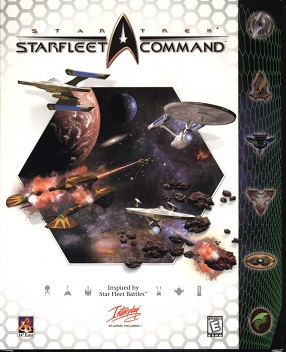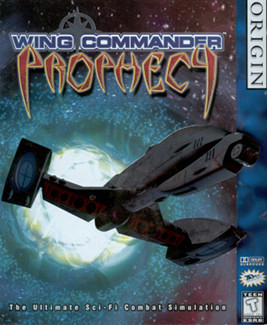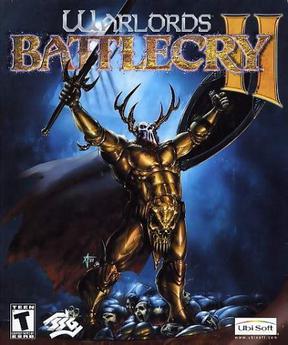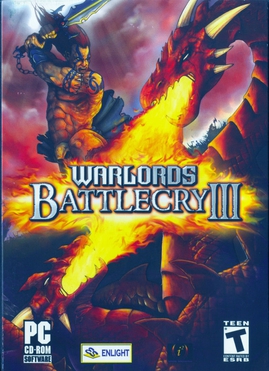
Star Trek: Starfleet Command is a computer game based on the table-top wargame Star Fleet Battles. It was developed by 14° East and Quicksilver Software and published by Interplay Entertainment. It was released in 1999 for Microsoft Windows. It simulates starship operations, ship-to-ship combat, and fleet warfare in the Star Trek universe. An expanded version was released in 2000 titled Star Trek: Starfleet Command - Gold Edition. It includes the latest patch and all the missions that were downloadable from the official website.

Age of Wonders is a 1999 turn-based strategy game co-developed by Triumph Studios and Epic MegaGames, and published by Gathering of Developers.

Shogun: Total War is a turn-based strategy and real-time tactics video game developed by The Creative Assembly and published by Electronic Arts for Microsoft Windows personal computers. Released in June 2000, the game became the debut title in The Creative Assembly's Total War series. Set in Japan during Sengoku jidai—the "Warring States" period from the 15th to the beginning of the 17th century—the game has players adopt the leader of a contemporary Japanese clan, attempt to conquer the nation and claim the position of shōgun. The turn-based aspect of the game focuses on a map of Japan where military force, religion, diplomacy, espionage and economics all influence the player's actions, whilst battles are fought in a 3D real-time mode.
Warlords is a video game series created by Steve Fawkner, in which role-playing elements are combined with turn-based strategy in a fantasy setting. The series began with Warlords in 1990 and includes three other games, two expansion packs, and several spinoffs.

Starlancer is a space-based science fiction flight simulator computer game, created by Erin and Chris Roberts, and developed by Warthog Games under the auspices of Digital Anvil.

4x4 Evo is a video game developed by Terminal Reality for the Windows, Macintosh, Sega Dreamcast, and PlayStation 2 platforms. It is one of the first console games to have cross-platform online play where Dreamcast, Macintosh, and Windows versions of the game appear online at the same time. The game can use maps created by users to download onto a hard drive as well as a Dreamcast VMU. All versions of the game are similar in quality and gameplay although the online systems feature a mode to customize the players' own truck and use it online. The game is still online-capable on all systems except for PlayStation 2. This was Terminal Reality's only video game to be released for the Dreamcast.

FIFA 99 is a football simulation video game developed by EA Canada and published by Electronic Arts under the EA Sports label. It is the sixth game in the FIFA series and was released in 1998 for Microsoft Windows, PlayStation and Nintendo 64.

Need for Speed: Porsche Unleashed, released as Need for Speed: Porsche 2000 in Europe and Need for Speed: Porsche in Latin America and Germany, is a 2000 racing video game. It is the fifth installment in the Need for Speed series. Unlike other NFS titles, Porsche Unleashed centers on racing Porsche sports cars, with models ranging from years 1950 to 2000. The game generally considered the final classic Need for Speed title before EA Black Box took over development for mainline entries in the series for many years beginning with the PS2 version of Need for Speed: Hot Pursuit 2. The game also marked the beginning of a 16 year exclusive licensing agreement between Porsche and EA that began in 2000 and ended in 2016 that prohibited most other developers from featuring Porsche cars in other video games without receiving a sub-license from EA. As a result of the licensing deal many games used Ruf models in place of Porsche to circumvent Porsche's licensing as Ruf is considered by the German government to be a full-fledged manufacturer, and as such Ruf models have unique VINs.

NASCAR Racing 3 is a racing simulator produced by Papyrus Design Group and published by Sierra Sports for Microsoft Windows in 1999.

Disciples: Sacred Lands is a turn-based strategy game published by Strategy First in 1999. Set in a fantasy world known as the Sacred Lands, it depicts a battle for dominance between the races of the world of Nevendaar. In 2001, an expanded version of the game was released titled Disciples: Sacred Lands - Gold Edition, which added 25 new scenarios.

Wing Commander: Prophecy is the fifth installment in the Wing Commander science fiction space combat simulator franchise of computer games. The game was released in 1997 for Windows, produced by Origin Systems and distributed by Electronic Arts. In 2003, a Game Boy Advance conversion with added multiplayer was produced by Italy-based Raylight Studios and distributed by Destination Software.

MechWarrior 3 is a vehicle simulation game, part of the MechWarrior series. It featured a new 3D accelerated graphics engine at the time of its release. The game contains over 20 missions, with access to 18 different mechs. A novelization called Trial Under Fire was written by Loren L. Coleman.

Jane's World War II Fighters is the 1998 combat flight simulation video game. Set in the European theatre of operations during World War II, it is part of the Jane's Combat Simulations franchise. The game was considered a commercial failure, and contributed to the end of the Jane's Combat Simulations line.

Warlords Battlecry II is a real-time strategy and role-playing game, developed by Strategic Studies Group (SSG) as the sequel to Warlords Battlecry. It was released on March 12, 2002. The game requires the player to build buildings and create units in order to defeat the enemy, while sending their hero on optional quests.

Infinity Plus Two, previously Infinite Interactive, is a video game developer with headquarters in St Kilda, Victoria, Australia. The company was founded by Steve Fawkner in 1989. After a long alliance with SSG, resulting in the development of the Warlords series of games, Steve moved on to make Infinite totally independent in 2003. Infinite Interactive was one of the first developers to port a full custom game engine to the iPhone in 2009. However due to Publisher issues it was not until much later that any properties were released on the iOS platform. In 2011, the company was acquired by fellow Australian developers Firemint, creators of Flight Control and Real Racing - however, in late 2012 Infinite Interactive announced their return as an independent developer.

Warlords Battlecry III is a real-time strategy game developed by Infinite Interactive and published in 2004. It is the third installment in the Warlords Battlecry series and the sequel to Warlords Battlecry II.

Steve Fawkner is an Australian video game designer, programmer, and composer. He created the Warlords game series, first released in 1989, and the Puzzle Quest series which began in 2007. He has been regarded as one of the most prolific and talented game designers in the industry.

Warlords III: Reign of Heroes is a computer wargame released in 1997, and the third release in the Warlords video game series. In 1998 it was followed by the expansion Warlords III: Darklords Rising.

Superbike 2001 is a motorcycle racing video game developed by Milestone srl, published by Electronic Arts (EA), and released in 2000 for Microsoft Windows. It is part of EA's Superbike video game series.

NFL Fever 2000 is an American football video game published and developed by Microsoft Game Studios for Windows in 1999. The game was followed by NFL Fever 2002.



















